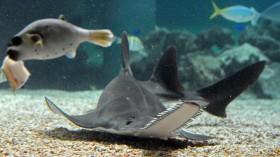Controversial British scientist David Nutt, a professor at Imperial College in London, has developed a new synthetic alcohol that promises a whole night of social and fun drinking without the risk of waking up wasted.
Nutt, who was reported to be fired by the British government from his position as a drug advisor after he claimed that ecstasy is safer than horse riding, is now claiming that he had developed and patented 90 different compounds called "Alcosynth"
"We know a lot about the brain science of alcohol; it's become very well understood in the last 30 years," said Nutt, in a report from Independent. "So we know where the good effects of alcohol are mediated in the brain, and can mimic them. And by not touching the bad areas, we don't have the bad effects."
According to the report from Fox News, Alcosynth is designed to have the fun and social effects alcohol, but does not cause any of the after-effects of alcohols, including dry mouth, nausea and throbbing head. Furthermore, Nutt claims that his compounds do not have benzodiazepine, which is used in the earlier versions of Alcosynth in 2011. However, Nutt did not reveal what is in their compounds, which remains to be a patented secret.
Out of the 90 different Alcosynth compound, two are already undergoing rigorous testing. One of the compounds being tested has no taste, while the other one is better. Both compounds can go well with scotch and gin. The compounds can also be used in mojitos, or even drinks that are as clear as Tom Collins.
The professor and his team hopes to make alcosynth available to the public by 2050 to completely replace is unhealthy alcohols we have to today.
In the U.S., Centers for Disease Control and Prevention estimated about 88,000 deaths and 2.5 million years of potential life lost due to excessive alcohol use every years between 2006 and 2010. Additionally, the economic costs of excessive alcohol consumption in 2010 were estimated at $249 billion, or $2.05 a drink.
Read More:
Science Confirmed! Drinking Beer Makes People Happier, Friendlier
Binge-Drinking on Campus: Which Students are at Risk?
Alcohol Could Cause 7 Types of Cancer, Study Finds
© 2024 NatureWorldNews.com All rights reserved. Do not reproduce without permission.
![Severe Thunderstorm Alert: Tornadoes, Damaging Winds and Hail Possible from Upper Ohio Valley to Northeast US [NWS]](https://1471793142.rsc.cdn77.org/data/thumbs/full/70161/280/157/50/40/severe-thunderstorm-alert-tornadoes-damaging-winds-and-hail-possible-from-upper-ohio-valley-to-northeast-us-nws.jpg)




